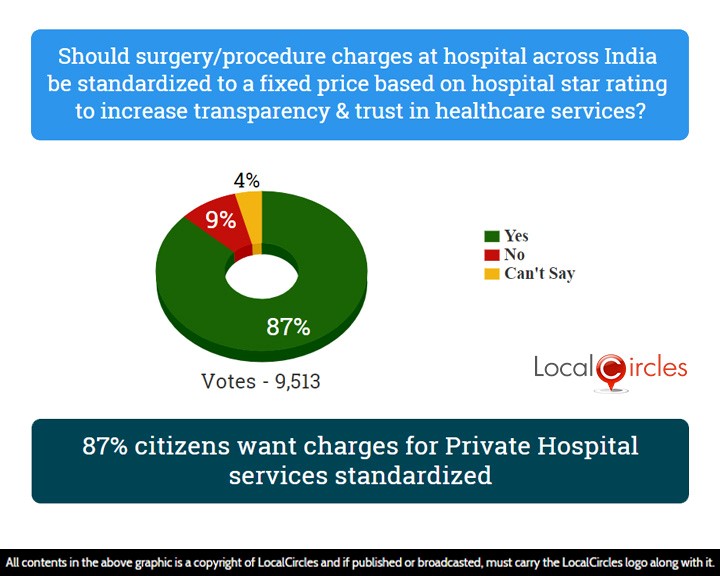Citizens want Government to reform healthcare in India in year 5
Highlights
- • Majority not happy with progress made in first 4 years
- • 87% citizens want charges for Private Hospital service standardized
- • 63% citizen say a Doctor’s compensation in hospital should not depend on number of procedures conducted or tests prescribed by them
- • 53% citizens want all consumables to be billed by hospitals at MRP or lower price
- • Only 32% citizens believe that healthcare facilities and services in their city have improved in the last 4 years
28th May 2018, New Delhi: There has been major discontent among citizens about the health care services available in the country. Low quality of Government Healthcare and Private Healthcare’s approach of operating like a business first and ethics later has majority of the citizens across the country concerned.
The government has been making some efforts to improve the healthcare facilities in India and new National Health Policy in 2017 after almost 15 years, is one such move. One of the priorities of this policy is to increase the healthcare expenditure by the government as a percentage of GDP from 1.5% to 2.5% by 2025.
LocalCircles conducted various polls to identify what should be done to ensure healthcare reform in India. In the first poll, citizens were asked if surgery/procedure charges at hospitals across India be standardized to a fixed price based on hospital star rating to increase transparency and trust in healthcare services, 87% replied in an affirmative, with 9% declining and 4% not being sure about it.
87% citizens want charges for Private Hospital service standardized

Many cases like children dying in a UP Government hospitals due to lack of oxygen, women giving birth outside hospitals and helpless patients waiting in the alleys of Government hospitals waiting to be attended by doctors have made headlines through the last few years. Citizens have a different set of issues with private hospitals where people feel that these are money making machines and many a times a patient is subjected to unnecessary surgeries, treatments and OPDs so everyone in the medical supply chain can meet their targets. This became evident in a recent case with a Gurgaon hospital where a - year old girl who died was billed some drugs and consumables at a profit of over 1700%.
The second question asked what should the compensation model of private hospitals for doctors be. 45% said they should be on salary only with strictly no incentives, 29% said they should be on salary plus incentives based on individual contribution, 18% said they should get salary plus incentives based on hospital profitability and 8% could not decide how it should be done.
63% citizen say a Doctor’s compensation in hospital should not depend on number of procedures conducted or tests prescribed by them

Many citizens had reported that doctors are usually given financial targets by hospitals and are incentivised every month for achieving them. This leads the doctors to unnecessarily prescribe tests and medicines to the patients, thereby increasing their bills by many folds.
Third poll asked how consumables should be used for a patient be billed by the hospital. 39% said there should be packages for treatment with a package price that includes all consumables, 53% said it should be basis actual MRP of consumables with services billed separately, 4% said it should be left on hospital’s discretion and 4% were unable to decide.
53% citizens want all consumables to be billed by hospitals at MRP or lower price

In parallel polls 74% said that corruption related to procurement/supplies is a common phenomenon at government hospitals while 85% citizens had said they prefer to go to private hospitals instead of government hospitals.
In the recent LocalCircles survey on 4 years of central government performance, only 32% citizens had said that healthcare facilities and services in their city have improved in the last 4 years whereas 62% said they have not improved.
Only 32% citizens believe that healthcare facilities and services in their city have improved in the last 4 years

Union Health Minister JP Nadda had recently directed Chief Ministers of all the states to adopt and implement the Clinical Establishments Act, 2010 so that malpractice in private hospitals can be curbed. The Act that applies to registration and regulation of all clinical establishments will also help the government to monitor the diagnostic centres and pathology labs running in various parts of the country and make sure that they adopt the right standards.
You may also like:
- • Upcoming Budget 2018: Healthcare is India’s most neglected area in every budget
- • Citizens want private hospital charges standardized
- • 66% citizens in favour of Government creating a price capped category for premium stents
LocalCircles, India’s leading Community Social Media platform takes Social Media to the next level and makes it about Communities, Governance and Utility. It enables citizens to connect with communities for most aspects of urban daily life like Neighborhood, Constituency, City, Government, Causes, Interests and Needs, seek information/assistance when needed, come together for various initiatives and improve their urban daily life. LocalCircles is free for citizens and always will be!
K Yatish Rajawat- media@localcircles.com
All content in the above graphics in this report are a copyright of LocalCircles and must be used only in the prescribed format. LocalCircles reserves the right to take legal action against any reproduction or redistribution of this content without explicit written approval of LocalCircles.


